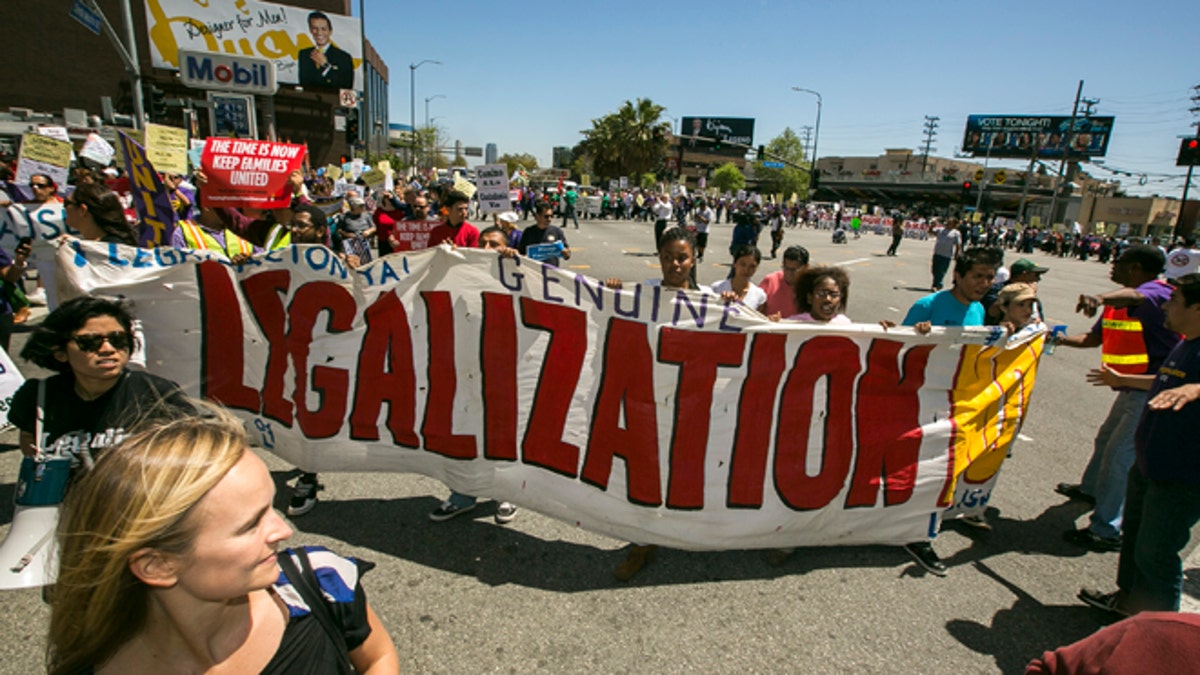
April 10, 2013: Activists rally for immigration reform in Los Angeles. (AP)
Six years after vowing to change immigration in a dramatic way through a comprehensive reform bill but failing, President Obama is said to be ready to pull the trigger on one of the most divisive issues to dog several presidential administrations.
White House officials have said the president is set to “go big.”
But if the messages – and polls results – coming from groups on all sides of the immigration debate on what to do are any indication, Obama is sure to “disappoint big” if and when he moves ahead with plans for unilateral executive action.
An ABC News/Washington Post poll showed that a slight majority, 52 percent, favors Obama taking executive action on immigration if Congress continues not to move forward on the matter.
But conservative groups point to other polls showing Americans opposed to the president taking unilateral action.
Many Americans, polls show, do not want the immigration system to continue as it is, but they also have misgivings about giving breaks – such as work permits and a path to legal status – to people who have broken immigration laws.
Even long-time advocates of comprehensive immigration reform that would include a path to legal status for undocumented immigrants suggest that whatever Obama – who has angered groups that want more liberal policies by presiding over a record number of deportations – ends up doing will be unsatisfactory.
“It appears that Obama is going to protect millions of families and that would be a huge victory, especially for immigrants and grassroots activists who have pushed so hard for so long,” Frank Sharry, executive director of America’s Voice, a group that advocates for more lenient immigration policies, told Fox News Latino.
“On the other hand, it is probable that millions will be left out, and we will have to continue fighting until they win relief.”
Many liberal groups - particularly those focused on building upon the 2012 Deferred Action for Childhood Arrivals, or DACA, initiative, which suspended deportation for undocumented immigrants who came to the U.S. before they were 16 and meet several other criteria - want to see this relief extended to a much broader group of people.
“Of course advocates want everyone protected right now, but DACA was a huge step forward,” Sharry said. “If the president goes big, this will be a giant step forward, but we won’t rest until 11 million people are protected – and ultimately, through an act of Congress, win a chance at citizenship.”
It remains unclear what policies the final version of the executive action would include.
But some media reports quoting people described as knowledgeable about the plan say it may include tightened border security, expanded work visas, extending a DACA-type relief to more undocumented immigrants, including the parents of those who have DACA and parents of U.S.-born children.
Republicans have said in no uncertain terms that they will not support executive action, which they are calling “executive amnesty.”
GOP leaders say it is no less than unconstitutional for the president to try to bypass Congress on immigration policy.
They vow to fight it from becoming a reality by denying funding for it, for one thing. Some GOP leaders also say they are prepared to fight it in court.
There is speculation that the president may be moving forward on executive action in order to force Congress to work on a comprehensive bill. Others speculate that it could be a political chess move, meant to make the GOP look bad if they fight immigration changes that many Latinos and other immigrants have long wanted.
Alex Nowrasteh, an immigration policy analyst at the Cato Institute, wrote recently, “If there was a serious congressional effort to reform immigration in the immediate future, then the President’s actions here would totally derail it.”
Nowrasteh went on, “Congress will not act to pass immigration reform if they are acting under threat of the president’s executive action.”
He added, “For Congress to act without looking like it is bending to president Obama’s threat, the specter of executive action would have to be credibly removed. But at this juncture, the president cannot credibly remove his threat of an executive action which means that Republicans in Congress won’t act to reform immigration.”
Some advocates indicate that they have waited so long for a major change, and a scaling back in deportations, that they will be receptive to whatever action Obama takes to address those issues.
“At this point, we know the president may not do what we want in this year's executive order,” Cesar Vargas, director of DREAM Action Coalition and a national activist for the DREAM Act, told FNL, "namely expand deportation relief to … deferred action for 8 to 9 million people, dismantling the Secure Programs, allow Dreamers into military.”
"Obama can repair his image if he acts immediately and does not give in to another delay," he said. "In other words, even though it won’t be enough, we will stand by him but he must act immediately."





















